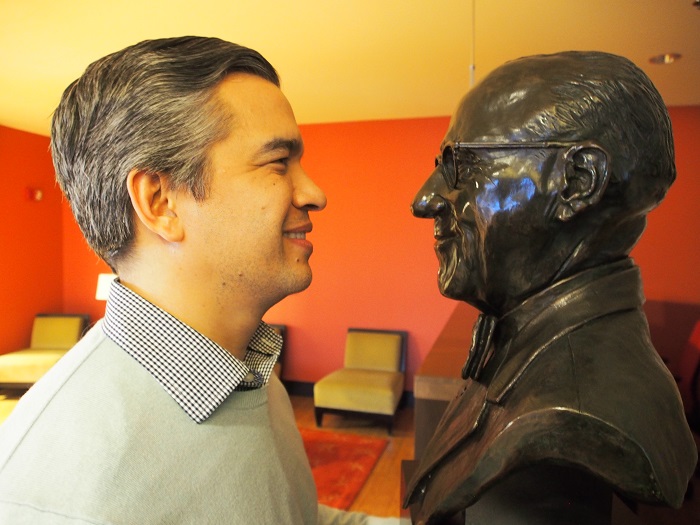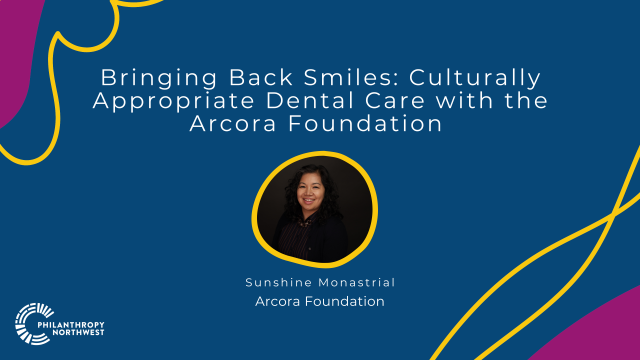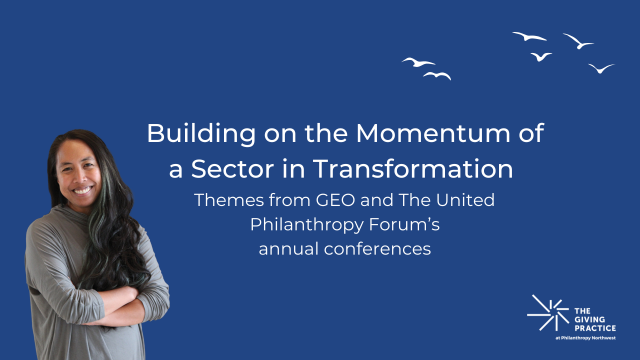Marcelo Bonta, Momentum Fellow
Pursuit of equity in grantmaking is the reason I joined the Momentum Fellowship. It’s a priority of the fellows, it’s a priority of Philanthropy Northwest and it’s a priority for Meyer Memorial Trust — the Oregon foundation hosting me and two other Momentum Fellows for the next 20 months.
Two experiences have led me here. First, as the only person of color — I am biracial: Filipino and white — at a national conservation organization, I experienced isolation, racism and a homogenous culture that restricted me from reaching my full potential. In the meantime, my multiracial daughters were born, and I wanted them to grow up in a world where they could pursue any career without institutional and systemic barriers. As a result, I started the Center for Diversity & the Environment, where I spent the past decade working with hundreds of leaders and organizations across the U.S. committed to racial and ethnic diversity, equity and inclusion (DEI) in the environmental movement.
(As I continue to use "DEI" terms, let me explain how I define them. When I mention "diversity," I mean all the ways we are different and unique. I define "equity" as the existence of conditions where all people can reach their full potential. I define "inclusion" as being valued, respected and seen, especially across differences like race and ethnicity. This is visible in an organization's culture, behavior and treatment of people.)
After 10 years of deeply meaningful and transformational work in the nonprofit sector, I stepped down as the center's executive director. As I pondered my next career move, what came up for me was a desire to continue to work on DEI in the environmental movement in an influential space that needed help: philanthropy.
Making Strides
Through my work in Oregon, I had heard about Meyer Memorial Trust's revised mission and values "to contribute to a flourishing and equitable Oregon." I was intrigued that the foundation had started its DEI journey by working on equity first, when most organizations begin with diversity. As part of this commitment, Meyer has created an equity statement, equity team equitable policies and mandated equity as a foundation for new programs. Then in 2015, Meyer started an environmental program with an equity focus. Perfect! I wanted to be part of that progress — but I was also apprehensive. In my experience, many organizations say they support equity, but are not taking adequate steps to make an impact. I was afraid Meyer would be satisfied by merely having racially diverse faces around the office, not necessarily actively working on equity issues internally and externally.
My fears were allayed immediately. From day one, I have felt a welcoming, warm, open culture from the board, executives, operations and program staff. For the first four months of my fellowship, Meyer has been a place where I can bring my full self to the work. Other staff value my voice and have already implemented some of my suggestions. For example, our Willamette River Initiative has created a stand-alone DEI goal rather than trying to infuse DEI in its established goals.

While adopting a more equitable and inclusive culture, Meyer has made strides on racial diversity. The last nine hires and the last three appointed board members have been people of color. Four out of seven executive-level staff are people of color. Overall, Meyer’s staff is now just under 50% people of color — and the organization is committed to ongoing learning. Last week, we held a staff racial equity training, required for all new staff and optional for staff who had participated in a similar training two years previously. All staff participated.
Overall, my experience has exceeded my expectations, and I feel that I have been set up for success, which leads me to the following question: Why is Meyer Memorial Trust succeeding at DEI? And what can other organizations learn from this example?
Finding the Starting Point
Perhaps the key is to decide which term is the best starting point: diversity, equity or inclusion?
Most organizations start with diversity; they focus on recruiting people of color or reaching out to communities of color first. But leading with diversity does not necessarily result in equity and inclusion. Organizations may become satisfied with numbers, and neglect to create an inclusive atmosphere or equitable programs that are relevant to the broader, diversifying community. In my experience, most DEI efforts that fail, no matter the good intentions, are efforts that do not successfully address equity and inclusion. Tokenizing is a common example of addressing diversity while overlooking the importance of equity or inclusion.
Inclusion as a starting point is difficult to address and implement because it requires a self-examination of deeply rooted norms and rules that have been in place for decades — created in a time when racism was more overt. For an established organization to start with inclusion would mean a total cultural transformation. For a new organization, however, where the organizational culture has not yet been developed, inclusion could be a successful way to begin the DEI journey.
Meyer has led its DEI work with equity, by institutionalizing equity into policies, programs and communications. Diversity then followed, because staff and board knew they could only meaningfully pursue equitable practices and programs if they included the voice of those who experience racial inequities. In short, if you are working on racial equity, you need to listen to and follow the lead of the racially oppressed who know the systemic and institutional racism firsthand. (Not a novel idea, but a simple approach that surprisingly does not happen as often as it should.) Also as a result of the equity focus, Meyer has made progress on creating an inclusive culture, which should be the most difficult part of DEI to address for an organization that's more than 30 years old. How has this happened? One explanation is that staff and board have a strong sense of emotional intelligence. The values of empathy, humility, transparency and flexibility were already part of Meyer's culture.
So, is leading with equity the real answer? Perhaps. We’ll see as more organizations follow suit.
Tough Questions Along the Way
As I continue my Momentum Fellowship journey learning about the intricacies of equity in grantmaking, tough questions remain. Even if Meyer gets everything right as an organization, will our work address and change the systems and institutions that have led us to an inequitable sector and society in the first place?
And is the broader philanthropy sector sustaining its own life and creating its own work by investing dollars in a system that continues to oppress and create the very problems that foundations are set up to address?
Are foundations missing deep, impactful solutions that breakdown systems and transform institutions because they too often ask the least impacted and most privileged to direct and find solutions for the most impacted and least privileged?
Dalian Yates, another Momentum Fellow, recently emailed our cohort a New York Times op-ed, Why Giving Back Isn’t Enough. The author, Ford Foundation's Darren Walker, describes the systemic challenges of equity in the philanthropic sector:
Too often, we have declined to question our own circumstances: a system that produces vast differences in privilege, and then tasks the most privileged with improving the system… ‘giving back’ is necessary, but not sufficient. We should seek to bring about lasting, systemic change, even if that change might adversely affect us. We must bend each act of generosity toward justice. We, as foundations and individuals, should fund people, their ideas and organizations that are capable of addressing deep-rooted injustice… are we hearing — and heeding — those who understand the problems best?
Walker ends with the most poignant question that all of us working in the philanthropy sector should think deeply about and ask ourselves and others: “What can we do to leverage our privilege to disrupt the drivers of inequality?” I'll add, "... in meaningful, equitable and truly successful ways that uplift the voice and values of the very communities that are most impacted by the inequities that foundations have tasked themselves to solve." Focusing on the "how" we do DEI work is more effective than focusing solely on the "what" we do.
While Meyer Memorial Trust, Philanthropy Northwest and the Momentum Fellowship may not holistically solve these deeply rooted systemic challenges anytime soon, we can surely pave the way towards an equitable future. I am grateful to be a part of this transformation, co-creating a place where my daughters and their children may thrive — in a "flourishing and equitable Oregon."
Marcelo Bonta is a Momentum Fellow hosted by Meyer Memorial Trust. Read more about the Momentum Fellowship on our website, and stay tuned for more blog posts from our first cohort.



Comments
Marcelo,
Marcelo,
Great post – honest, authentic to you, challenging, and inviting!
Here are the parts that really touched me:
• “If you are working on racial equity, you need to listen to and follow the lead of the racially oppressed who know the systemic and institutional racism firsthand.”
• Importance of foundation culture to do DEI work (emotional intelligence and values of empathy, humility, transparency and flexibility)
• Problem of foundations asking “the least impacted and most privileged to find solutions for the most impacted and least privileged”
• Dalian’s idea to “bend each act of generosity toward justice”
Keep these posts coming. Philanthropy needs this. Glad you landed where you have!
Sincerely,
Holly Powers
(The Russell Family Foundation)
Powerful & important question
Powerful & important question: "is the broader philanthropy sector sustaining its own life and creating its own work by investing dollars in a system that continues to oppress and create the very problems that foundations are set up to address?" Thank you for sharing your insight, Marcelo.
Outstanding article that hits
Outstanding article that hits all the high notes, Marcelo. I'm delighted to have your voice, passion, intelligence and joyful personality in the office. We are more likely to succeed because of your presence.
Marcelo: Thank you for the
Marcelo: Thank you for the insights contained in this article. I too stepped back, as ED of E3 Washington and have been taking a 30K view of the field of environmental and sustainability education/learning and how broad it actually is when inclusion is the lens looked through (thank you for the DEI description). There is much to be done and the next five years will be pivotal in the work to shift practice in existing institutions and create new ones for the world that is emerging. With gratitude for your perspective, Abby
Marcelo,
Marcelo,
Brilliant piece. Thank you as always for your heart and spot on insight.
Great article with helpful
Great article with helpful guidance for organizations seeking to begin and nurture their dedication to equity. Thank you!!
I can relate to your post.
I can relate to your post. Thank you so much for this.
Thank you all for your
Thank you all for your wonderful feedback! I am glad my perspectives in the blog are of use to you and that you all continue to move equity, inclusion, and diversity (EID- maybe we should start ordering it differently? a suggestion a friend shared with me) in your sphere of influence. Progress will only happen when we each do our part. I am so happy to be on this journey with you and thousands of others uplifting the voices of those facing disparities on a daily basis. Together, we are creating a new, accurate story that needs be told by numerous storytellers, which is key to usher in change. Thank you!
Brilliant, candid and helpful
Brilliant, candid and helpful. Thank you, Marcelo. I am looking forward to reflecting - and acting on - your questions in our work here at Philanthropy Northwest. You are a gifted and compassionate teacher and we are all fortunate to have your voice in the sector.
Marcelo - This is a great
Marcelo - This is a great article. As an exec. director of a conservation organization that supports thousands of groups across the country, I believe we have a special obligation push toward a future where these groups are as diverse as the communities they are apart of. And we have a long way to go. Across the US, river and watershed organizations are only 4% diverse according to our annual trends survey. To remain socially relevant, we have a long way to go. And on the topic of equity, much can be done to engage those who have not been well-represented in discussions pertaining to water. We have been driving conversation within our community around these themes for the last year or so via our publications, national conference, and other means. And we have a concept paper that includes what more we can do. We have a unique position from which to drive change. Yet, without funding, we are stuck. I'd love to have a conversation with staff from foundations and other NGOs to figure out how we break through together. Happy to brainstorm with you about this too (nsilk@rivernetwork.org). Thanks for your leadership.
Hi Marcelo, Thanks for this
Hi Marcelo, Thanks for this thought-provoking post. It's difficult to choose the right access point between Diversity-Equity-Inclusion. I had been thinking that inclusion was the logical first step, but you make a good case for equity. Thank you for your leadership and sharing your story so others can benefit from your experience and knowledge. Cheers, Rob